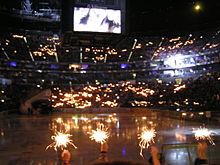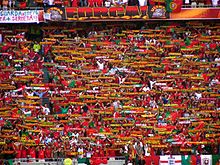Fan (person)
![]()
The title of this article is ambiguous. For other meanings, see Fan (disambiguation).
![]()
This article or section is still missing the following important information:
It lacks a history overview, and thus unfortunately also lacks important information about the context of the phenomenon. Since when have there been fans? Can the admirers who adored and idolized the castrati in the 17th and 18th centuries, or Goethe in the early 19th century, be classified as "fans"? Unfortunately, there is also almost nothing about the history of the mass media, whose emergence, spread and differentiation of content has probably contributed more to the emergence of fanhood than any other factor. Also a view over the European-North American edge of the plate would be an enrichment for the article.
Help Wikipedia by researching and adding them.
A fan ([fɛn]; from Latin: fanaticus - seized by the deity, thrown into frenzied enthusiasm; English: fanatic - zealous, ruthlessly committed, rapturous) is a person who has a long-term passionate relationship with a fan object that is external to him, public, either personal, collective, representational, abstract or sporting, and who invests resources such as time and/or money in the emotional relationship with this object. The intensity of the attachment varies greatly.
Fans often come together in fan clubs. If the enthusiastic following of fans refers to individuals, the latter are referred to as stars. The enthusiastic following is usually expressed in rituals of veneration of the person, group or thing in question. The worship that fans celebrate is also referred to as a cult and has given rise to an extensive fan culture. It is also often based on myths surrounding the object of worship. The expression of fan culture is considered an indicator of local and/or national sentiments. For example, German football fans at the 2006 World Cup in Germany (summer fairy tale) had a lasting positive impact on the image of Germans abroad.

Family of football fans
Etymology
The word fanatic, derived from the Latin (fanaticus/-a/-um), first appears in German in the 16th century, but was only used in a religious context. Since the 19th century, fanatical has also been used in politics and sports.
The word "fan" in its current usage and pronunciation has been transferred from English (fan [fæn], short form of fanatic = "fanatic") into numerous languages, including German, Spanish, French and Czech (fanoušek). Despite the etymology, fan has nothing to do with the term fanatic, which has negative connotations in the political sense. In English, fans are therefore usually referred to as supporters. The Italian term tifoso, derived from typhoid fever, or in the plural tifosi, meaning fans as "fellow fans", is often used as a synonym for Italian fans at a sporting event. In Italy itself, the term partigiano is often used in addition, which would translate as "partisan". Borrowed from Spanish and adopted into English and German is another synonym, the aficionado as "lover" of a thing.
As a person-related short word fan, it can be found in the adoration of musicians and music groups, athletes, sports and sports teams, comic/series/novel and film genres, actors, YouTubers, and numerous other people, activities, and topics.
For fans of computer programs or game consoles, there are the usually negatively connoted Anglicisms "fanboy" and "fangirl" in Internet forums. Comic fans and particularly passionate fans of certain genres (especially science fiction) are also sometimes referred to in this way, although with far less negative connotations.
Fanboys and fangirls are usually characterized by the fact that they have a particularly extensive knowledge of the subject area they value (or the person they admire), they defend the subject area or person passionately in disagreements and, as actually intelligent and eloquent people, they are speechless in the presence of or in direct contact with their idols.
For the latter context and similar involuntary overload reactions, neologisms such as fangasm, a portmanteau of the English terms fan and orgasm (orgasm), or stan, a neologism made up of "fan" and stalker, which describes obsessive attachment to certain celebrities, were also created.
Areas of interest of fan groups
Sports
Fans are enthusiastic about a sport (e.g. football fans), a sports club or an individual athlete. In the case of sports clubs, fans who attend their team's competitions are also called "spectators". They provide a "home advantage" in their own venue by their majority and accompany their team to away matches. If this happens on a large scale and according to plan, it is referred to as "ground hopping".
Many fans show their allegiance to "their" team by wearing jerseys, scarves, caps or other items of clothing with the team's name or logo. They communicate with each other through fan chants. The acoustic support is often coordinated by a precentor. Further messages are given by banners or flags.
A special form of this is the Ultra movement, which is particularly committed through choreographies in the stadium and other actions.
At major events, so-called public viewing is also offered more and more frequently. For example, fans met on the fan miles during the 2006 World Cup. They also test their knowledge with sports betting and betting games, where they try to predict the outcome of the games.
At major events (such as a World Cup) there is often the type of 'event fan', i.e. a light-hearted casual fan who has little or no interest in football during the season, but who is carried away by the atmosphere of major tournaments.
It is often criticised that the police increasingly place football fans under general suspicion, which also criminalises the mass of peaceful supporters.
Music
Fans adore a particular genre of music, a band or a singer. They attend concerts, festivals and other musical events. They also collect albums, posters, t-shirts, buttons and other devotional items.
Already in ancient cultures, the almost religious worship of musicians in particular was widespread. This continued through the following ages, such as the Romantic period with, for example, Niccolò Paganini and Franz Liszt. Since the middle of the 20th century, with the rise of international rock music, rock 'n' roll and beat music, the phenomenon of the music fan has spread en masse. Here, Frank Sinatra in the 1940s, Elvis Presley in the 1950s and the Beatles in the 1960s stand out in particular, having triggered a wave of enthusiasm and fanatical adoration. Since the 1990s, a new fan culture has emerged due to the fragmentation of pop styles, the fast pace of product cycles and the general expansion of the concept of stardom. Of particular note here is the phenomenon of boy bands such as Take That or Backstreet Boys, most of whom were hysterically worshipped by girls aged 10 to 19. Around the same time, similar movements (namely K- and J-pop) emerged in the Korean and Japanese music industries, but it is only since the 2010s that they have increasingly reached a rapidly growing fan base of pubescent girls in Europe and North America through their embrace of the boy group success concept.
Theatre, film and television
The love of the fans can relate to certain theaters, films, television series, presenters, directors, authors or actors. In film and television, fans can influence production, as sequels or new episodes of a series are only filmed if there is a large audience response. In theatre, too, the even more immediate audience reaction has a great influence on the frequency of performances as well as revival and continuation decisions and can sometimes even lead to minor and major changes in the text or other components of the respective production within a season.
Art
Devotees of a particular artist or genre are more often referred to as "enthusiasts". They sometimes act as art collectors or promote art as patrons. In particular, patronage by wealthy people is economically important for the art scene. This can also lead to relationships of dependency.

Darkened LANXESS Arena illuminated by Cologne Haie fans

Portuguese fans at the 2004 European Football Championship

Berlin Fan Mile at the 2006 Football World Cup
Search within the encyclopedia